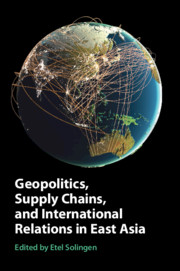Book contents
- Geopolitics, Supply Chains, and International Relations in East Asia
- Geopolitics, Supply Chains, and International Relations in East Asia
- Copyright page
- Dedication
- Contents
- Figures
- Tables
- Contributors
- Preface and Acknowledgements
- 1 Introduction: Geopolitical Shocks and Global Supply Chains
- Part I Global Supply Chains, Geopolitics, and Trade Wars
- Part II Domestic Political, Economic, and Social Dimensions of Global Supply Chains
- 8 Are Global Supply Chains Vital to China’s Leaders?
- 9 Firms Fight Back: Production Networks and Corporate Opposition to the China Trade War
- 10 Understanding and Contesting Global Supply Chains in an Era of Inequality
- 11 Why Escalate? Cognitive Theory and Global Supply Chains in Northeast Asia
- 12 The Role of Chinese Workers in Supply Chain Campaigns
- Part III Postscript on Covid-19
- References
- Index
9 - Firms Fight Back: Production Networks and Corporate Opposition to the China Trade War
from Part II - Domestic Political, Economic, and Social Dimensions of Global Supply Chains
Published online by Cambridge University Press: 07 May 2021
- Geopolitics, Supply Chains, and International Relations in East Asia
- Geopolitics, Supply Chains, and International Relations in East Asia
- Copyright page
- Dedication
- Contents
- Figures
- Tables
- Contributors
- Preface and Acknowledgements
- 1 Introduction: Geopolitical Shocks and Global Supply Chains
- Part I Global Supply Chains, Geopolitics, and Trade Wars
- Part II Domestic Political, Economic, and Social Dimensions of Global Supply Chains
- 8 Are Global Supply Chains Vital to China’s Leaders?
- 9 Firms Fight Back: Production Networks and Corporate Opposition to the China Trade War
- 10 Understanding and Contesting Global Supply Chains in an Era of Inequality
- 11 Why Escalate? Cognitive Theory and Global Supply Chains in Northeast Asia
- 12 The Role of Chinese Workers in Supply Chain Campaigns
- Part III Postscript on Covid-19
- References
- Index
Summary
The Trump administration’s multi-front trade war dramatically escalated with the imposition of extraordinary tariffs on Chinese imports in 2018. Corporate America has responded with a concerted campaign of resistance. We document these efforts – through extensive participation in notice and comment and public coalition-building – and show that corporate opposition to the trade war is primarily a consequence of firms' sourcing and production linkages with China. In contrast, we find far weaker efforts by anti-trade firms to support the trade war, whether to insulate themselves from import competition or to confront Chinese trade practices. We therefore describe and empirically illustrate the politics of global production networks, and highlight that scholars of trade politics should not neglect opposition to the Trump trade agenda arising from globally integrated firms. Global order in the area of trade hangs in the balance in an ongoing fight between corporate globalism and populist nationalism.
Keywords
- Type
- Chapter
- Information
- Publisher: Cambridge University PressPrint publication year: 2021
- 4
- Cited by

